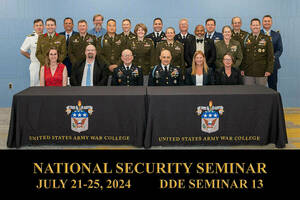
Erin B. Corcoran attended the Army War College’s National Security Seminar July 21-25 in Carlisle, Pa. In this conversation, Corcoran, who serves as associate teaching professor in the Keough School of Global Affairs and executive director of the school’s Kroc Institute for International Peace Studies, discusses the experience, and how she used it to share insights on peacebuilding and human dignity with influential leaders who help shape global policy.
At first glance, this might seem like an unlikely opportunity. What can the United States’ national security establishment learn from a globally focused peacebuilding unit like the Kroc Institute?
The Kroc Institute’s experience in research, policy and practice is crucial to providing critical insight to the complexities of modern day warfare and national security challenges. Utilizing a comprehensive understanding of what is required for optimal security, our school’s Kroc Institute is well positioned to inform policy and operational decisions for the U.S. military and global security apparatus.
In addition to diplomacy and combat readiness, national security policies need to be attentive to the key markers of a peaceful and just society. The broad inclusion of civilian voices, coupled with structural reform to key aspects of society such as education, health care, climate, economic security and an enduring commitment to the rule of law, are necessary components for maintaining peace and security.
You had multiple opportunities to share your expertise at this forum. What were these conversations like?
I participated in a seminar discussion on national security issues with military leaders in the U.S. Army, Marines, Navy, Air Force and National Guard. In addition to the military leaders, the seminar also included the Mexican ambassador to the Organisation for Economic Co-operation and Development Paris and senior leaders from the Federal Emergency Management Agency and the U.S. Department of State.
We discussed important lessons gleaned from the ongoing conflict between Ukraine and Russia, the rise of artificial intelligence and technology in war and peacemaking and the need to provide stability economically and politically in fragile states to avoid conflict.
My training and experience as a human rights lawyer informed conversations around a variety of topics, including:
- The Geneva Conventions;
- Who qualifies as a combatant in contemporary conflicts, given the rise of technology and social media, and,
- Humanitarian assistance and aid in conflict zones.
And you also discussed conflict prevention, which is an area of emphasis for both military leaders and scholars here in our school. Talk a bit about that.
The military’s mission is not only to win wars, but also to prevent conflict and participate in diplomatic and operational efforts to establish and keep peace. With that in mind, I highlighted the role that our Kroc Institute, particularly through its Peace Accords Matrix Colombia Barometer Initiative, has in assessing and evaluating the peace agreement in Colombia.
Specifically, I highlighted the significance of having a third party to verify the accord and how our past research and monitoring of other peace agreements can provide valuable insights to the parties of the accord on what practices are more likely to lead to sustainable and lasting peace.
In addition, I discussed how our research — which explores peace and climate change, the inclusion of women, indigenous populations and victims in peace processes and the role of religious dialogue — is crucial to eliminating not only direct violence, but also structural and cultural violence.
Our research and teaching provide important insight to policy makers in the United States and globally about best practices and innovative solutions to addressing conflict.
It sounds like this is an example of a partnership that yields real policy impact. Do you share that assessment?
Absolutely, and relationship-building is an important part of it. The Keough School, through its Kroc Institute, has a long history with the Army War College. Over the years, faculty members including George A. Lopez, David Cortright and Jerry Powers have attended sessions and shared insights. And there will be more opportunities for engagement going forward. This is an important relationship that we will continue to cultivate.
Importantly, this relationship — and the conversations and insights we share through it — have a real effect on policy. Policy decisions at a national and global level require an understanding and balancing of the competing interests among sovereign states and individual actors. Conflict often arises out of a competition for scarce resources such as water, natural resources and land.
Building relationships with external partners actively contributes to building peaceful societies that foster respect for human rights.
For the military, engaging with external partners who have significant experience in conflict prevention and transformation, such as our Kroc Institute, can help shape policies both in pre- and post-conflict environments that advance human dignity and human rights. For example, U.S. military policies should include the role of the military in the delivery of humanitarian aid, the establishment of humanitarian corridors during an ongoing conflict and the negotiations to cease armed conflict and restore societies in a way that promotes human rights and justice.
Ultimately, building relationships with the military and external partners not only creates better understanding, but actively contributes to building peaceful societies. It helps foster a respect for human rights, democracy and ethical practices in sustainable development and it centers human dignity — a respect for each person and the whole person — in the design of policies that shape our societies.
Top photo: Erin B. Corcoran (front row, right), executive director of the Keough School’s Kroc Institute for International Peace Studies, attended the Army War College’s National Security Seminar July 21-25 in Carlisle, Pa., sharing insights on conflict prevention that will inform senior military leaders.
Originally published by keough.nd.edu on August 2, 2024.